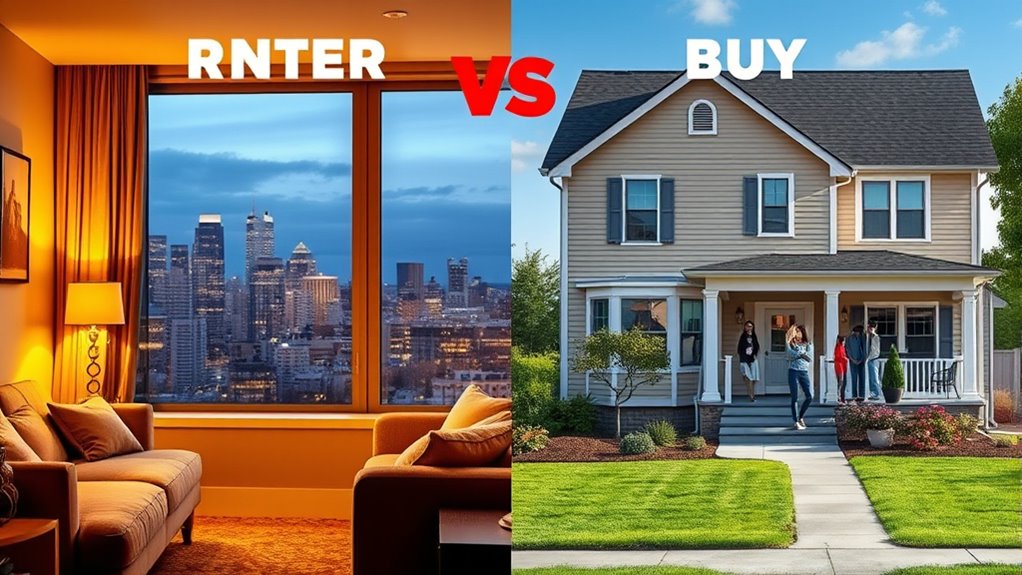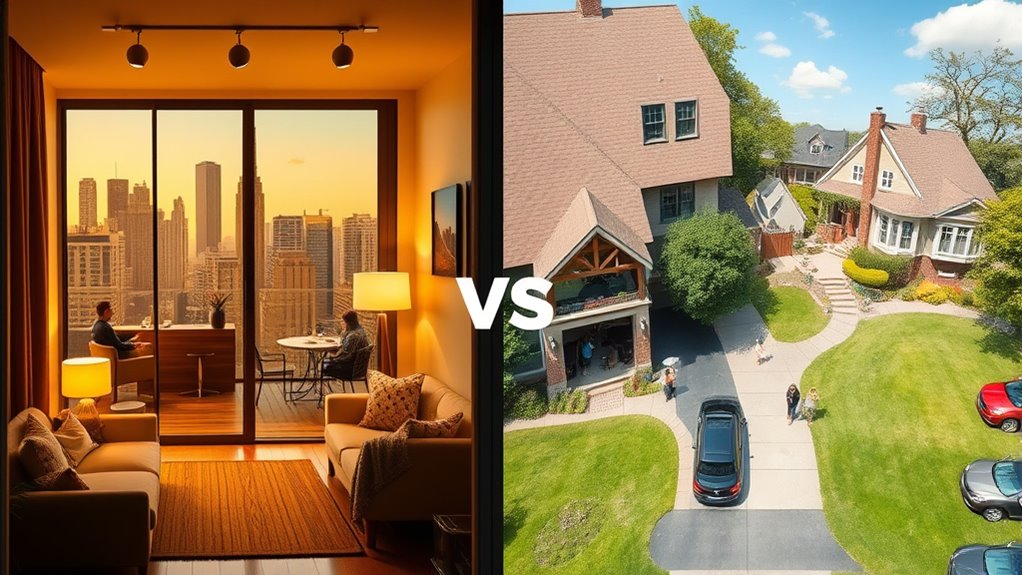When comparing renting versus buying, consider your financial situation, long-term goals, and lifestyle needs. Key factors include property taxes, which vary by location and impact costs, and mortgage rates that affect your monthly payments and overall affordability. Buying offers stability and equity, but involves higher upfront costs and ongoing maintenance. Renting provides flexibility, less responsibility, and fewer upfront expenses. To make an informed choice that suits your future, understanding how these factors interplay is essential.
Key Takeaways
- Assess your long-term financial stability and whether you can handle upfront costs and ongoing maintenance expenses.
- Consider local property tax rates and mortgage interest rates to evaluate overall affordability and future obligations.
- Determine your lifestyle needs for flexibility and mobility versus stability and potential equity building.
- Compare monthly costs of renting versus buying, including taxes, mortgage payments, and maintenance responsibilities.
- Analyze how local economic trends and personal plans align with the advantages and risks of each option.

Deciding whether to rent or buy a home is a critical financial choice that depends on your personal circumstances and long-term goals. When weighing your options, you need to consider not just monthly payments but also the broader financial implications. One important factor is property taxes, which can greatly influence the overall cost of homeownership. Unlike rent, which often includes property taxes in the landlord’s expense, as a homeowner, you’ll be responsible for paying property taxes directly to local authorities. These taxes can vary widely depending on where you live and can increase over time, impacting your budget. As a result, it’s essential to research local property tax rates and understand how they might affect your affordability in the future. Additionally, vetted resources like local government websites can help you estimate future tax obligations more accurately.
Property taxes vary widely and can impact your long-term homeownership costs.
Mortgage rates also play an essential role in deciding whether to buy a home. If mortgage rates are low, locking in a fixed-rate mortgage can make homeownership more affordable in the long run. Lower rates mean lower monthly payments and less paid in interest over the life of the loan, making buying more financially attractive. Conversely, if mortgage rates are high, your monthly payments could be substantial, which might make renting a more practical choice until rates improve. Keep in mind that mortgage rates fluctuate based on economic conditions, so staying informed can help you time your purchase more effectively.
Beyond these financial factors, consider your stability and lifestyle preferences. Renting offers flexibility—you can move more easily if your job situation changes or if you want to explore different neighborhoods. Buying, on the other hand, often requires a longer-term commitment, but it can build equity and provide stability. If you plan to stay in one place for several years, buying might be more advantageous, especially if property values are appreciating.
Another consideration is maintenance and repair costs. As a renter, your landlord typically handles these expenses, saving you time and money. As a homeowner, you’ll need to budget for ongoing repairs and unexpected issues, which can add up and affect your financial planning. Additionally, the upfront costs of buying, such as down payments, closing costs, and moving expenses, are often higher than the initial costs of renting.
Ultimately, your decision hinges on your financial situation, risk tolerance, and future plans. Carefully evaluate property taxes and mortgage rates, and think about how these factors align with your lifestyle. By doing so, you’ll be better equipped to choose the option that fits your needs and sets you up for long-term financial stability.
Frequently Asked Questions
How Does Property Appreciation Impact the Decision to Rent or Buy?
Property appreciation influences your decision because rising market trends increase property valuation, making buying more attractive. If property values are appreciating steadily, your investment could grow over time, offering potential equity gains. Renting may be less appealing if market trends show strong appreciation, as you’re missing out on potential gains. Consider the current appreciation rate and future market outlook to determine if buying aligns with your financial goals.
What Are the Tax Advantages of Homeownership Versus Renting?
Imagine opening hidden benefits with homeownership. You can take advantage of mortgage deductions, reducing your taxable income each year. Plus, when you sell your property, the potential for capital gains exclusions lets you keep more of your profit. These tax advantages often make buying more attractive than renting, offering financial perks that grow with your investment. So, owning a home might just turn into a smart move for your financial future.
How Do Local Housing Markets Influence Renting Versus Buying Decisions?
Local housing markets markedly influence your decision to rent or buy. If market trends show rising home prices, buying could be a smart investment, while falling prices might favor renting. Neighborhood dynamics also matter; strong communities with good amenities make buying more appealing, whereas areas with high turnover or unstable markets might be better suited for renting. Stay informed about local market trends to make the choice that best fits your financial goals and lifestyle.
What Are the Hidden Costs Associated With Renting and Buying?
Did you know that hidden fees and maintenance costs can add up to thousands annually? When renting, you might overlook expenses like hidden fees for late payments or extra charges for amenities. Buying, on the other hand, involves ongoing maintenance costs that often surprise new homeowners. Both options have unexpected costs that can strain your budget if you’re not prepared, so it’s essential to factor these in before making your decision.
How Does Future Financial Stability Affect the Choice Between Renting and Buying?
Your future financial stability plays a vital role in deciding whether to rent or buy. If you have steady employment and adequate savings, buying might be a good option, giving you long-term benefits. However, if your employment is unstable or your savings are limited, renting offers flexibility and lower upfront costs. Assess your job security and savings carefully to make the best choice aligned with your financial future.
Conclusion
Ultimately, whether you rent or buy depends on your personal situation and goals. Some say buying builds wealth, but renting offers flexibility and fewer upfront costs. The truth is, neither choice is universally better—it’s about what aligns with your financial stability, lifestyle, and future plans. Take the time to weigh these factors carefully. A well-informed decision can lead to long-term satisfaction, regardless of which path you choose.









